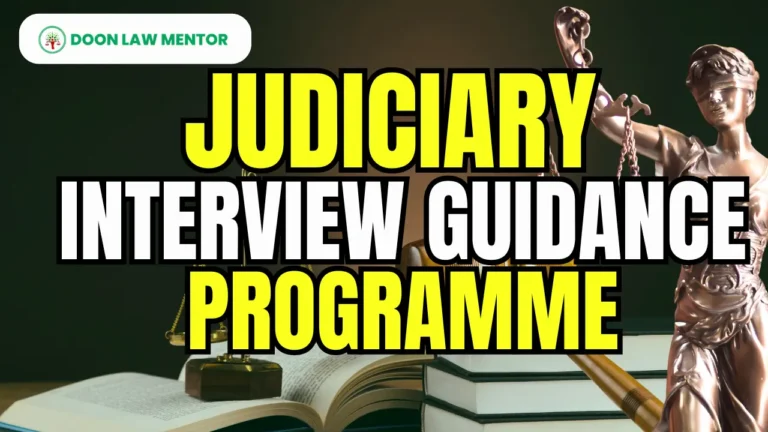Explore the role of Article 21 implications in the Pegasus spyware case, analyzing the Supreme Court’s stance on privacy versus national security. This guide offers insights for law students and judiciary aspirants preparing for 2025.
Table of Contents
Introduction to Article 21 and the Pegasus Spyware Case
The Pegasus spyware case has brought the delicate balance between individual privacy and national security into sharp focus, with Article 21 of the Constitution of India, 1950, at its core. Article 21, guaranteeing the right to life and personal liberty, has been interpreted to include the right to privacy, as established in Justice K.S. Puttaswamy v. Union of India (2017) (Citation: AIR 2017 SC 4161). The Supreme Court’s observations on April 29, 2025, during the Pegasus hearing underscored that while spyware use for national security is not inherently illegal, the targets of such surveillance matter significantly.
For law students and judiciary aspirants preparing for judiciary interview 2025, understanding the role of Article 21 in this case is crucial for tackling questions on constitutional law, privacy rights, and state surveillance. This article explores the legal framework, judicial observations, and socio-political implications of the Pegasus case, offering strategies to address related state-specific law questions in judiciary interview 2025 with insights from Doon Law Mentor.
Legal Framework of Article 21 in the Pegasus Context
Article 21 ensures that “no person shall be deprived of his life or personal liberty except according to procedure established by law.” The Puttaswamy judgment expanded its scope to include the right to privacy as a fundamental right, subject to reasonable restrictions for national security or public interest. In the Pegasus spyware case, the Supreme Court addressed allegations of targeted surveillance of journalists, activists, and politicians using the Israeli spyware Pegasus, raising questions about Article 21 violations.
The court’s 2021 interim order, forming a committee led by Justice R.V. Raveendran, emphasized that unauthorized surveillance undermines free speech and press freedom, protected under Article 19 and Article 21. The bench, led by Chief Justice N.V. Ramana, rejected the Centre’s national security defense as a “free pass,” asserting that Article 21 mandates judicial oversight to protect individual rights. The April 2025 hearing, before Justices Surya Kant and N. Kotiswar Singh, reiterated that while spyware possession is permissible, its use against “civil individuals” must comply with constitutional safeguards, highlighting the role of Article 21 in balancing privacy and state interests.
Supreme Court’s Observations on Pegasus and Article 21
During the April 29, 2025, hearing, the Supreme Court made critical observations about the role of Article 21 in the Pegasus spyware case:
- Spyware Use Not Inherently Illegal: Justice Surya Kant noted that possessing spyware for national security is not problematic, but its application must be scrutinized. This aligns with Article 21’s requirement of a fair and lawful procedure for any privacy intrusion.
- Protection of Civil Individuals: The court emphasized that “civil individuals” have a constitutional right to privacy under Article 21, distinguishing them from terrorists, who cannot claim such rights, as noted by Solicitor General Tushar Mehta.
- Judicial Oversight: The bench upheld the need for transparency, allowing petitioners to submit a U.S. court judgment (WhatsApp v. NSO Group) to clarify hacking allegations, reinforcing Article 21’s procedural safeguards.
- Non-Cooperation by the Centre: The Justice Raveendran Committee reported the Centre’s lack of cooperation, raising concerns about accountability under Article 21.
These observations underscore the role of Article 21 in ensuring that state actions, even for national security, comply with constitutional protections, a key topic for judiciary interview 2025.
Historical Context of Pegasus and Privacy Concerns
The Pegasus spyware case emerged in 2021 when The Wire and international publications reported that Pegasus, developed by Israel’s NSO Group, was used to target over 300 Indian mobile numbers, including journalists (e.g., Paranjoy Guha Thakurta, N. Ram), politicians (Rahul Gandhi), and activists. Pegasus can access messages, calls, and data, posing a significant threat to privacy under Article 21. The petitioners, including Advocate M.L. Sharma and the Editors Guild of India, sought an independent probe, citing violations of fundamental rights.
The Supreme Court’s 2021 order forming the Justice Raveendran Committee was a landmark response, reflecting Article 21’s expansive interpretation post-Puttaswamy. The committee found malware in 5 of 29 devices examined, though it couldn’t confirm Pegasus specifically. The U.S. court’s 2024 ruling in WhatsApp v. NSO Group, cited by Kapil Sibal, confirmed India as a Pegasus target, strengthening the case for transparency under Article 21.
Read More: Ace Judiciary Interview Preparation 2025 with Expert Video Lecture Tips
Judicial Precedents Shaping Article 21 in Surveillance Cases
Several landmark judgments have defined the role of Article 21 in surveillance and privacy:
1. Justice K.S. Puttaswamy v. Union of India (2017)
The Puttaswamy case established privacy as a fundamental right under Article 21, subject to reasonable restrictions (e.g., national security). It mandated that surveillance must follow proportionality and procedural fairness, directly relevant to the Pegasus spyware case. Citation: AIR 2017 SC 4161.
2. People’s Union for Civil Liberties v. Union of India (1997)
The PUCL case addressed telephone tapping, ruling that surveillance must comply with Article 21’s procedural safeguards, such as prior judicial approval. It set a precedent for regulating state surveillance. Citation: AIR 1997 SC 568.
3. Shreya Singhal v. Union of India (2015)
While primarily about free speech, this case reinforced Article 21’s protection of digital rights, striking down Section 66A of the Information Technology Act, 2000, for vagueness, relevant to Pegasus’s digital surveillance concerns. Citation: AIR 2015 SC 1523.
These cases are critical for aspirants to cite when discussing the role of Article 21 in state-specific law questions in judiciary interview 2025.
Is Pegasus Spyware Use a Violation of Article 21?
The Pegasus spyware case raises a central question: does its use violate Article 21? Below are arguments for and against:
Arguments Supporting Violation
- Unauthorized Surveillance: Targeting journalists and activists without judicial oversight breaches Article 21’s privacy protections, as argued by Kapil Sibal and Shyam Divan.
- Lack of Transparency: The Centre’s non-cooperation with the Justice Raveendran Committee, as noted in 2021, undermines procedural fairness under Article 21.
- Chilling Effect: Surveillance stifles free speech (Article 19) and liberty (Article 21), as seen in the targeting of figures like John Brittas and Rupesh Kumar Singh.
Read More: 10 Essential Tips for Judiciary Interview for First-Time Aspirants 2025
Arguments Against Violation
- National Security: The Solicitor General’s argument that “terrorists cannot claim privacy rights” aligns with Article 21’s exceptions for security, as supported by Justice Kant’s observations.
- Legal Framework: Spyware use under laws like the Information Technology Act, 2000, or Telegraph Act, 1885, may comply with Article 21 if proportionate and authorized.
- Unclear Evidence: The Justice Raveendran Committee couldn’t confirm Pegasus specifically, weakening claims of widespread Article 21 violations.
For judiciary interview 2025, aspirants should balance these arguments, emphasizing Puttaswamy’s proportionality test to demonstrate nuanced understanding.
Case Study: Answering a Judiciary Interview Question
Consider the question: “How does Article 21 apply to the Pegasus spyware case?” Using the IRAC method:
- Issue: Does Pegasus surveillance violate Article 21’s right to privacy?
- Rule: Article 21 includes privacy as a fundamental right (Puttaswamy, AIR 2017 SC 4161), requiring surveillance to be lawful, proportionate, and necessary.
- Application: Pegasus’s alleged targeting of journalists and activists without transparency breaches Article 21, though national security may justify limited use.
- Conclusion: While spyware isn’t inherently illegal, its use against civil individuals without oversight violates Article 21.
Video lectures from Doon Law Mentor guide aspirants in structuring such answers for state-specific law questions in judiciary interview 2025.
Table: Key Aspects of Article 21 in the Pegasus Case
| Aspect | Description | Relevance to Article 21 |
|---|---|---|
| Right to Privacy | Established in Puttaswamy (2017) | Protects against unauthorized surveillance |
| National Security | Exception under Article 21 | Justifies spyware use if proportionate |
| Judicial Oversight | Mandated by PUCL (1997) | Ensures procedural fairness in surveillance |
| Transparency | Demanded by petitioners | Critical for Article 21 compliance |
This table aids quick revision for judiciary interview 2025 questions on Article 21.
Practical Tips for Judiciary Interview 2025
To excel in state-specific law questions in judiciary interview 2025 on the Pegasus spyware case, aspirants should:
- Study Key Cases: Memorize Puttaswamy and PUCL holdings.
- Practice Mock Interviews: Simulate questions like “Does Pegasus violate Article 21?”.
- Follow Updates: Track the July 30, 2025, hearing and U.S. judgment details .
- Use Bare Acts: Review Article 21 and Information Technology Act, 2000, with resources from WritingLaw.
These tips ensure readiness for state-specific law questions in judiciary interview 2025.
Challenges in Addressing Pegasus Questions
Aspirants may face challenges like:
- Complex Legal Issues: Simplify Article 21’s proportionality test using Law Prep Tutorial lectures.
- Balancing Arguments: Acknowledge national security needs while emphasizing privacy rights, as taught in Doon Law Mentor.
- Evolving Case: Stay updated on the July 2025 hearing to address recent developments in interviews.
These strategies help tackle state-specific law questions in judiciary interview 2025 effectively.
Conclusion and Key Takeaways
The Pegasus spyware case highlights the role of Article 21 in balancing privacy and national security, a critical topic for judiciary interview 2025. The Supreme Court’s stance that spyware use is permissible but must target appropriate individuals underscores Article 21’s procedural safeguards. Key takeaways include:
- Article 21 protects privacy, requiring lawful and proportionate surveillance (Puttaswamy).
- The Pegasus spyware case raises concerns about unauthorized targeting of civil individuals.
- Judicial oversight ensures accountability, as seen in the Justice Raveendran Committee.
- Aspirants should cite cases and use IRAC to answer state-specific law questions in judiciary interview 2025.
Enroll in Doon Law Mentor’s courses and mock interviews to master Article 21 and excel in your judiciary interview 2025. Start your preparation today!
FAQs
1. How does Article 21 apply to the Pegasus spyware case?
Article 21 protects the right to privacy, requiring surveillance like Pegasus to be lawful and proportionate, as established in Puttaswamy (2017).
2. Why is the Pegasus case relevant for judiciary interview 2025?
It tests knowledge of Article 21, privacy rights, and national security, key for state-specific law questions in judiciary interview 2025.
3. What did the Supreme Court say about Pegasus use?
The court stated that spyware possession is not illegal, but its use against civil individuals must comply with Article 21’s safeguards.
4. How can I prepare for Pegasus-related questions in interviews?
Study Puttaswamy, practice IRAC with mock interviews from Doon Law Mentor, and follow the July 2025 hearing.
5. What role did the Justice Raveendran Committee play?
The committee, formed under Article 21’s mandate, probed Pegasus allegations but faced non-cooperation from the Centre, highlighting transparency issues.
6. How does the Pegasus case balance privacy and national security?
Article 21 allows surveillance for security but requires judicial oversight and proportionality to protect privacy, as debated in the Pegasus spyware case.
Tags: Article 21, Pegasus spyware case, right to privacy, national security, judiciary interview 2025, state-specific law questions, constitutional law
Hashtags: #Article21 #PegasusSpyware #PrivacyRights #JudiciaryInterview2025 #NationalSecurity #DoonLawMentor











